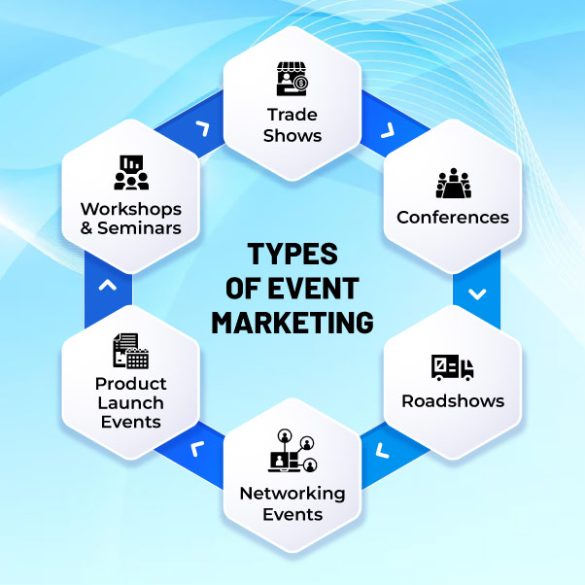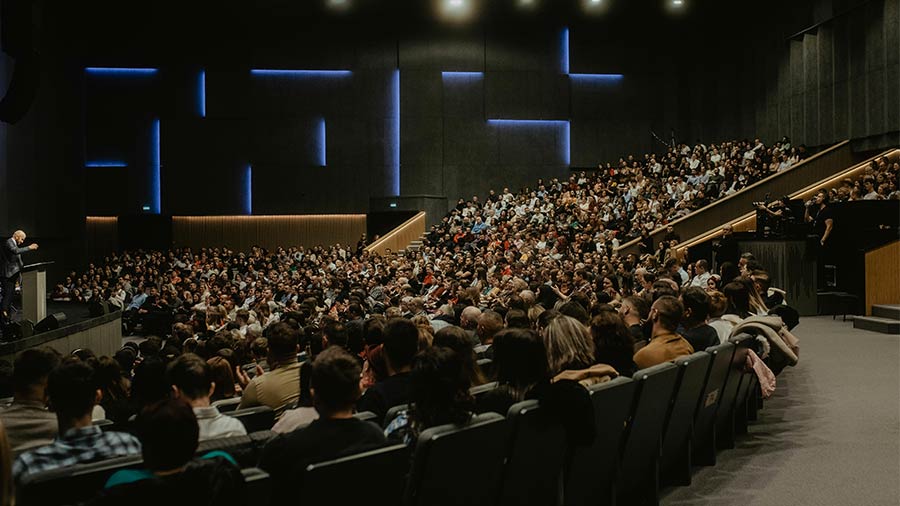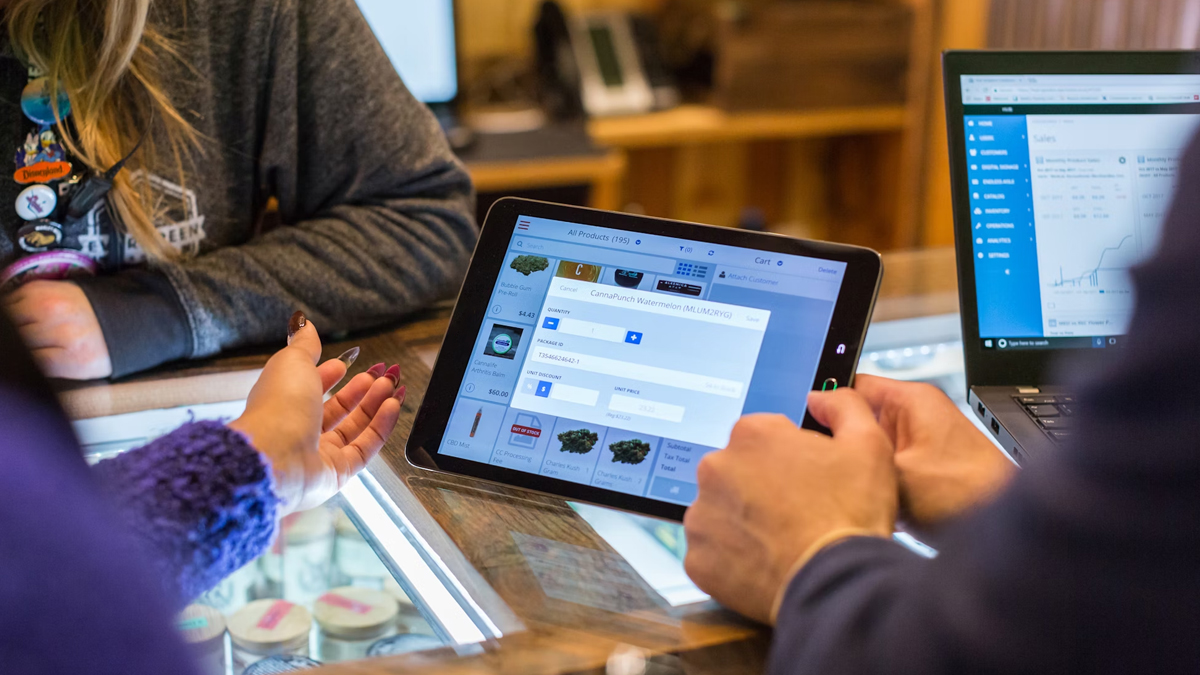Event marketing is a powerful strategy that allows businesses to engage directly with their audience, enhance brand awareness, visibility, and drive sales. In today’s fast-paced market, live events like trade shows, event marketing conferences in 2025, and product launches play a crucial role in establishing connections and generating leads. This comprehensive guide will explore the intricacies of B2B event marketing, covering essential elements such as strategy development, pre-event promotion, engagement during the event, and effective follow-up and deliver substantial returns on investment through an event marketing solution tailored to their goals.
What is B2B Event Marketing?
B2B Event Marketing Definition: B2B Event marketing is a strategic approach where businesses create in-person, virtual, or hybrid events to connect directly with their target audience, promote their brand, and drive results. These events, which range from event marketing conferences, trade shows, and product launches to webinar marketing, workshops and event marketing online campaigns, serve as impactful touchpoints that offer value to participants while enhancing brand visibility and reputation. Additionally, well-executed B2B events can help businesses refine their product-market fit by gathering real-time feedback from attendees and prospects.
In essence, B2B event management can have two main purposes: using marketing tactics to promote an event or leveraging events themselves as event marketing tactics to showcase products or services. For many organizations, recognizing the importance of lead generation tactics within their B2B event marketing strategy is essential, as events form a substantial part of their marketing budget. This focus on B2B event marketing aligns with its proven effectiveness in building strong customer relationships and generating leads.
Events offer a unique opportunity for businesses to position themselves as industry leaders, build meaningful communities, and foster partnerships. The face-to-face, interactive nature of events creates memorable experiences that leave lasting impressions on attendees, helping to cultivate customer loyalty and trust. By integrating a robust B2B event marketing strategy, companies can achieve higher engagement, generate quality leads, and ultimately, drive growth in a way few other marketing channels can match.
Benefits of B2B Event Marketing
Event marketing offers numerous advantages for brands looking to build awareness, engage prospects, and boost sales. Among the primary benefits of event marketing for B2B companies is increased brand exposure, allowing businesses to showcase their products to a broader audience. By participating in or hosting events to promote business, businesses can introduce their offerings in a highly interactive way, helping potential customers experience firsthand the value they provide. This enhances visibility, making brands memorable and more likely to convert leads into sales. Additionally, leveraging events to promote your business provides valuable opportunities for networking and engagement, while carefully planned events to advertise your business can effectively showcase products and services to a targeted audience, drive brand awareness and lead generation.
With the rise of event marketing online, businesses can extend their reach even further, connecting with global audiences in virtual or hybrid event formats. By selecting events that cater to specific industries, businesses can ensure they connect with prospects who are most likely to benefit from their products. Personalized invitations and careful event selection ensure the right people are in attendance, which can lead to higher-quality leads. Events also offer a unique opportunity for B2B marketers to build relationships with both new and existing customers. Engaging face-to-face allows businesses to foster trust and rapport, opening doors for future collaboration or upselling. Additionally, B2B event marketing helps build a strong pipeline of qualified leads. A tailored event marketing strategy for B2B companies ensures these events target the right audience, driving more meaningful interactions.
In addition, events provide a platform for establishing industry leadership. By sharing knowledge and expertise, businesses can position themselves as thought leaders, gaining credibility within their field. Successful event marketing strategies include content that not only promotes products but also showcases a company’s thought leadership, making them stand out in the industry. Finally, events offer valuable customer and competitor insights, enabling businesses to fine-tune their offerings, address pain points, and stay ahead of the competition.
Types of Event Marketing
B2B Event marketing offers a range of strategies to engage audiences, promote brands, and build connections. Here are six key types of events:
- Trade Shows: Exhibitions where businesses showcase their products or services to a targeted audience within a specific industry. Attending or hosting a booth through event marketing services allows brands to network and generate leads effectively. A successful trade show booth should reflect the brand’s value and encourage visitor engagement.
- Conferences: Large-scale events organized by one or more companies, often spanning several days and featuring activities like workshops, seminars, and keynote sessions. Leveraging event marketing services for conferences allows brands to establish industry authority and deepen client relationships. To succeed, detailed planning and strong industry connections are essential.
- Roadshows: One-day events are held across various locations to reach broader audiences, especially in emerging markets. Roadshows create buzz and attract media attention by bringing the brand directly to potential clients. Inviting influencers and current customers to speak can enhance credibility and audience engagement.
- Networking events: Smaller, more intimate gatherings focused on building connections within a targeted group. They are affordable, require only a venue, and help brands solidify relationships with existing clients and attract new leads. By using event marketing services to invite key account managers, brands can strengthen industry connections.
- Product launch events: Exclusive events for introducing new products or services are typically invite-only and geared toward media, influencers, and top clients. Well-executed launch events generate excitement and brand exposure. Proper event marketing planning is critical, as poorly executed launches can impact brand reputation.
- Workshops and seminars: Educational events like workshops or seminars offer value to existing customers and help with retention by providing hands-on learning and product training. These events enhance the customer experience and can boost brand loyalty by offering a personalized, value-driven experience.

Developing an Event Marketing Strategy
Creating a successful event marketing strategy requires careful planning and execution across various stages. Here’s a concise guide to help you navigate the process effectively.
Step 1: Pre-Registration Planning
Kick off your B2B event marketing strategy well at the pre-event stage. Focus on generating excitement and gauging interest within your target audience. Use engaging email invitations with an attention-grabbing title to stir anticipation and foster a sense of community. This foundational stage sets the tone for your event and encourages early engagement.
Step 2: Launch Registration and Ticket Sales
Once you open registration, activate all your marketing channels. Utilize press releases, blog posts, and influencer partnerships to reach a wider audience. Invest in targeted advertisements to maximize visibility. This is the time to amplify your messaging and attract potential attendees, ensuring your B2B event marketing tactics resonate across various platforms.
Step 3: Optimize the Registration Process
As the registration deadline approaches, pivot your strategy to create urgency. This crucial period requires a renewed focus on ticket sales. Highlight limited availability, upcoming deadlines, and last-minute promotions to drive registrations. Effective communication during this stage boosts your attendee numbers and builds relationships by personalizing the experience.
Step 4: Execute During the Event
Even after your event promotion efforts, your role isn’t over once the event begins. Ensure everything runs smoothly, manage attendee interactions, and address any real-time issues. Gather feedback from participants and monitor the B2B event marketing success, as these insights will be invaluable for future marketing strategies.
Step 5: Post-Event Engagement
After the event concludes, your marketing activities should continue. Analyze attendance data and gather feedback to evaluate the event’s success. Share highlights through photos and videos, and engage with attendees via follow-up emails. Foster ongoing community interaction that builds relationships by sharing upcoming event plans and engaging attendees early.
Step 6: Measure Success and Set KPIs
Establish key performance indicators (KPIs) before launching your marketing campaigns. Whether your goals are centered on ticket sales, attendance numbers, or lead generation activities, tracking these metrics will help you assess the effectiveness of your strategy. Use this data to refine future events and demonstrate value to sponsors and stakeholders.
Driving High-Quality Leads with Event Marketing
By leveraging various strategies such as remarketing, pop-ins, long-form content, and growth hacking, event marketers can connect with audiences, capture attention, and guide leads through the conversion process.
Remarketing: In a digital landscape where attention is fleeting, event marketing campaigns that incorporate remarketing keep your event top-of-mind for potential attendees. Through tools like Google Ads, you can set tags on your website to target visitors with tailored ads across platforms like YouTube and Facebook, creating a consistent lead generation activity for your event. However, this approach should be used thoughtfully to respect data privacy concerns and avoid excessive intrusiveness, which can harm brand reputation.
Exit intent pop-ins: Exit-intent pop-ups serve as timely prompts that catch visitors’ attention without being overly aggressive. These can encourage actions like signing up for email updates or early bird discounts, helping convert casual browsers into engaged lead generation activities. For example, pop-ins can be tailored to different user interactions, such as a countdown for early bird registrations or offering additional event-related materials as incentives. This approach works best when your website is designed to showcase the event’s value and relevance.
Long-form content: High-quality, in-depth content like blog posts, reports, or guides not only informs but also strengthens SEO, attracting organic traffic to your event page. Long-form content lets you highlight aspects of the event or provide valuable insights into key topics. B2B event marketing ideas like repurposing this long-form content into shorter formats for social media help maintain engagement across multiple channels, driving interest and registrations.
Social media and influencer partnerships: Utilizing social media and influencer partnerships as part of event marketing campaigns can greatly expand your reach and draw high-quality leads. Influencers whose audiences align with your target market can help promote your event authentically. Create engaging posts, launch interactive contests, and use trending hashtags to maximize visibility. This strategy is particularly effective in generating buzz and building anticipation.
FOMO growth hacking: Growth hacking techniques like exclusive offers or early bird discounts create a sense of urgency and leverage FOMO (fear of missing out) to prompt immediate action. Combining this with email marketing updates and visually captivating content (such as event teaser videos) can help sustain excitement and keep your event in the minds of prospective leads.
Evaluating the Success of Your Event
Here’s a guide to the main metrics and analysis methods for assessing your event’s impact.
Post-Event Surveys
Surveys help gauge attendee satisfaction. Ask participants to rate their experience on a scale, averaging responses to establish a satisfaction benchmark. Including a Net Promoter Score (NPS) question gives insight into how likely attendees are to recommend your event. Also, gather open-ended feedback for suggestions to refine future events. A concise survey improves response rates, ensuring you get valuable input.
Attendance and Engagement Rate
Attendance rate is a straightforward measure of interest and follow-through. Calculate it by dividing actual attendees by registrants. Look at engagement metrics such as participant attention and interaction levels for virtual events. This helps assess not just attendance but also how well the event captured attention, especially in webinar marketing, where engagement metrics are crucial for success.
Social Media Engagement
Social media interactions can indicate event reach and attendee engagement. Encourage participants to use a designated hashtag and tag your organization. Track mentions, shares, and follower growth across platforms like Facebook, Twitter, and Instagram. High engagement on social media can amplify your event’s impact, increasing brand visibility.
Revenue and Donations
If revenue generation was an objective, monitor purchases and donations before, during, and after the event. Post-event sales, especially when linked to the event, demonstrate its effectiveness in driving financial support. This metric is vital for events aiming to enhance funding or generate profit.
Sponsor Satisfaction
For events involving sponsors, understanding their satisfaction is crucial for fostering long-term partnerships. Use surveys to collect sponsor feedback and measure NPS. A high score reflects sponsor engagement and opens the door for future collaborations.
Benchmarking for Future Events
After assessing your event’s success, create benchmarks for future improvement. Pay attention to popular event components, such as days, times, and venues, with the highest attendance. Use survey responses to pinpoint favorite aspects and areas needing enhancement.
Post-Event Sales
Monitor sales data in the days following the event. A spike in sales often correlates with successful event exposure. This trend indicates lasting impact and brand recognition, further reinforcing the event’s success.
B2B Event Marketing Best Practices
Here are the key event marketing best practices:
Mastering pre-event marketing: Building excitement before an event is crucial for driving attendance and engagement. Successful pre-event marketing not only boosts ticket sales but also strengthens brand visibility and prepares the audience for a memorable experience. Use social media, email campaigns, and teaser content to generate anticipation and establish a connection with your target audience through event-based marketing, which supports demand generation efforts.
Identifying and segmenting the audience: Start by segmenting your audience based on demographic data, interests, and behaviors. Using tools like surveys, social media insights, and website analytics helps you identify your audience’s needs and tailor your message accordingly, making your event-based marketing efforts more relevant and engaging. This is also critical for webinar marketing, where understanding audience behavior ensures better targeting and conversion
Creating a clear, compelling message: A persuasive, well-crafted message is essential to conveying the value of attending your event. Your message should highlight the unique benefits of participation and speak directly to the audience’s interests. Craft a strong call to action (CTA) that guides them on their next step, whether it’s registering, sharing, or engaging further. This builds relationships with potential attendees before the event even begins while supporting your sponsorship marketing strategy to attract additional sponsors.
Developing a multi-channel strategy: Using multiple channels allows you to reach a wider audience and keep them engaged. On social media, use visually appealing content, event-specific hashtags, and interactive posts like polls and contests to spark interest. Content marketing, through blog posts or videos, can offer deeper insights into event topics, speakers, or themes, boosting organic traffic and search visibility. Collaborating with influencers and using paid ads can also expand reach and credibility, strengthening your event-based marketing initiatives.
Leveraging technology and automation tools: Tools like event marketing software, social media schedulers, and analytics platforms streamline outreach and tracking efforts. Automation tools, such as email or social media scheduling, allow you to focus on strategy and innovation, making your campaigns more efficient and effective. These efforts build relationships with your audience and stakeholders, ensuring long-term engagement and trust.
Building partnerships and collecting feedback: Collaborating with partners and sponsors who share a similar audience expands your reach and credibility. Joint awareness campaigns, and webinar marketing in partnership with influencers or brands can exponentially increase your reach. Additionally, gathering feedback through surveys and tracking metrics like social engagement and email open rates helps refine your strategy, ensuring continuous improvement and relevance.
Authentic event reviews: When attendees share honest feedback, future participants gain a clearer understanding of the event’s value, creating credibility around the experience. Positive, authentic reviews foster community trust and make events feel more engaging and reliable. This helps establish a stronger reputation, which can increase attendance at future events through lead generation activities. Such reviews also reinforce the success of your sponsorship marketing strategy by showcasing the value of participation.
B2B Event Marketing Challenges and Solutions
Challenge 1: Increasing Costs: As the complexity of B2B event marketing grows, so do the associated costs, from venue rental to staffing. Rising expenses can strain budgets and limit the event’s scope, especially with unexpected costs.
Solution: To mitigate costs, seek sponsorships and partnerships that add value while offsetting expenses. A well-executed sponsorship marketing strategy can help generate additional revenue and reduce financial burdens. Consider digital or hybrid formats, which reduce physical logistical costs while broadening audience reach.
Challenge 2: Budgeting and ROI: Event planners often struggle to forecast budgets and measure ROI, as the benefits of B2B marketing can be intangible. Proving financial value and meeting engagement targets is essential for justifying event investments.
Solution: Use tracking tools to monitor spending and outcomes, setting clear KPIs for engagement and financial goals. Analytics can help optimize spend and evaluate success, enabling data-driven decisions.
Challenge 3: Tight Timelines: An event marketing plan involves tight schedules, leading to rushed decisions and potential oversights. Managing details under pressure can impact event quality and attendee experience.
Solution: Implement robust project B2B event management practices with detailed timelines, checklists, and buffer times for unforeseen issues. This approach helps ensure efficiency, builds relationships within the team, and smooth execution.
Challenge 4: Selecting the Right Venue: Finding a venue that meets all requirements—such as capacity, accessibility, and technology—can be challenging. Venue choice heavily influences the event’s atmosphere and attendee experience.
Solution: Start early and assess multiple venues based on a checklist of needs. Use virtual tours and reviews to make informed choices that align with event goals.
Challenge 5: Prioritizing Networking Opportunities: Networking is often key to event value, yet it can be overlooked during planning. Without structured networking, attendees may miss valuable connection opportunities.
Solution: Schedule dedicated networking times and spaces. Consider event apps to enhance networking, allowing personalized, tech-enabled experiences that increase attendee engagement.

Key Trends in B2B Event Marketing
To stay competitive, companies must adopt the best event marketing strategies to create memorable, impactful experiences, turning their brand to demand by engaging attendees in meaningful ways.
Gamification for Engagement
Traditional conference formats often struggle to maintain attendee interest. Gamification addresses this by incorporating interactive elements like games and achievement rewards, making events more engaging. This trend, already gaining traction in 2024, is expected to grow in 2025, providing fun ways to boost attendee participation and keep the energy high.
Prioritizing Wellness
Wellness will be central in 2025 events, focusing on physical, mental, and financial health. Attendees can expect to see wellness breaks, mindfulness sessions, and expert talks on managing stress and financial planning. Prioritizing wellness highlights a company’s commitment to attendee well-being, providing both personal and professional value.
Crafting the Right Vibe
Setting the right atmosphere is increasingly crucial as attendees value events that resonate emotionally. Whether aiming for high energy or a calm space, intentionally designed event vibes enhance the experience. Carefully curated environments will help make events memorable and foster deeper connections.
Trending Locations
Destination matters more than ever, with locations like Nashville, Atlanta, and Puerto Rico becoming popular choices. Warmer climates will appeal to those escaping colder seasons, while off-season deals in cooler areas offer budget-friendly options. Choosing trending locations can elevate the appeal and accessibility of an event.
Innovative Program Formats
Long sessions are out; compact, interactive formats are in. Event programs will increasingly favor small group interactions and creative, participatory sessions. This approach enhances retention and makes events more dynamic, ensuring that attendees leave with memorable, actionable insights. Integrating the best event marketing strategies for program design will be key to engaging audiences effectively.
Conclusion
B2B event marketing is an invaluable strategy that enables companies to foster strong, lasting connections with their target audience. By understanding the elements of successful event marketing—from strategic planning to post-event engagement—businesses can maximize brand exposure, generate high-quality leads, and reinforce customer loyalty. Events offer unique touchpoints where brands can showcase their expertise, foster trust, and build memorable experiences that resonate well beyond the event day. By implementing best practices and continuously refining approaches based on feedback and data, companies can create impactful events that drive growth, solidify their industry position, and provide substantial returns on investment. Embracing a well-rounded strategy is key to thriving in today’s competitive B2B landscape.




